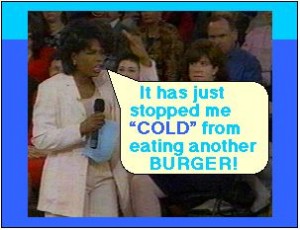I’ve seen this reel before.
It probably won’t end well.
During the April 16, 1996 Oprah Winfrey show, the host stated she would stop eating hamburgers because of fears over BSE or mad cow disease and that she was shocked after a guest said meat and bone meal made from cattle was routinely fed to other cattle to  boost their meat and milk production. The camera showed members of the studio audience gasping in surprise as vegetarian activist Howard Lyman explained how cattle parts and downer cattle (downer is the generic term used to describe cattle who can simply no longer stand) were rendered and fed to other cattle.
boost their meat and milk production. The camera showed members of the studio audience gasping in surprise as vegetarian activist Howard Lyman explained how cattle parts and downer cattle (downer is the generic term used to describe cattle who can simply no longer stand) were rendered and fed to other cattle.
News of the popular show’s content swept through the cattle futures markets, contributing to major declines in beef contracts as traders feared it would turn Americans away from beef. Yet, when the U.S. Food and Drug Adminstration announced its ban on ruminant protein in ruminant feed, the move was widely praised as prudent given the severity of the consequences should BSE be discovered in North America. Even the U.S. rendering industry, which in the early days of public attention after the March 20, 1996 announcement linking BSE to human deaths in the U.K. argued that negative public perception of the industry was simply a function of inflammatory language (one industry official, during a panel discussion in July 1996, said that part of the problem was that the word downer was a negative term; instead, industry was urging producers and others to describe such animals as non-ambulatory), eventually supported the measures, with the U.S. National Renderers Association quoted as saying the ban on mammalian protein in ruminant feed put “a protective blanket around the cattle industry.”
Shortly thereafter, Oprah, along with her production company and vegetarian activist Howard Lyman, were named in a $10.3 million lawsuit brought by Texas cattle ranchers.
Beyond the media circus in Amarillo, Texas, where the savvy Oprah taped her show during the trial in a star-studded appeal to public sentiment, the trial was the first legal test of food defamation laws, then on the books in 13 U.S. states.
The Texas version of the food libel law allows recovery of damages if someone knowingly makes a false claim about a food that causes consumers to refuse to buy it – and the producer to lose money.
Oprah won, not only in court, but in the court of public opinion.
Today, Beef Products Inc. filed a defamation lawsuit against ABC News seeking $1.2 billion in damages for misleading consumers about lean finely textured beef, more commonly known as pink slime.
The lawsuit was filed in South Dakota, which is where BPI is based.
 The reports cited in the lawsuit include those aired on television and online.
The reports cited in the lawsuit include those aired on television and online.
MeatingPlace.com reports in May, BPI shut down production at three of its four production facilities and eliminated dozens of corporate jobs.
In a statement posted on the ABC News website, from Jeffrey W. Schneider, Senior Vice President, ABC News, the company said, “The lawsuit is without merit. We will contest it vigorously.”
AP is reporting the 257-page lawsuit names American Broadcasting Companies, Inc., ABC News, Inc., Sawyer and ABC correspondents Jim Avila and David Kerley as defendants. It also names Gerald Zirnstein, the USDA microbiologist who named the product “pink slime,” Carl Custer, a former federal food scientist, and Kit Foshee, a former BPI quality assurance manager who was interviewed by ABC.
The “defendants engaged in a month-long vicious, concerted disinformation campaign against BPI,” the lawsuit claims.
The reports cited in the lawsuit include 11 that aired on television and 14 that appeared online between March 7 and April 3.
